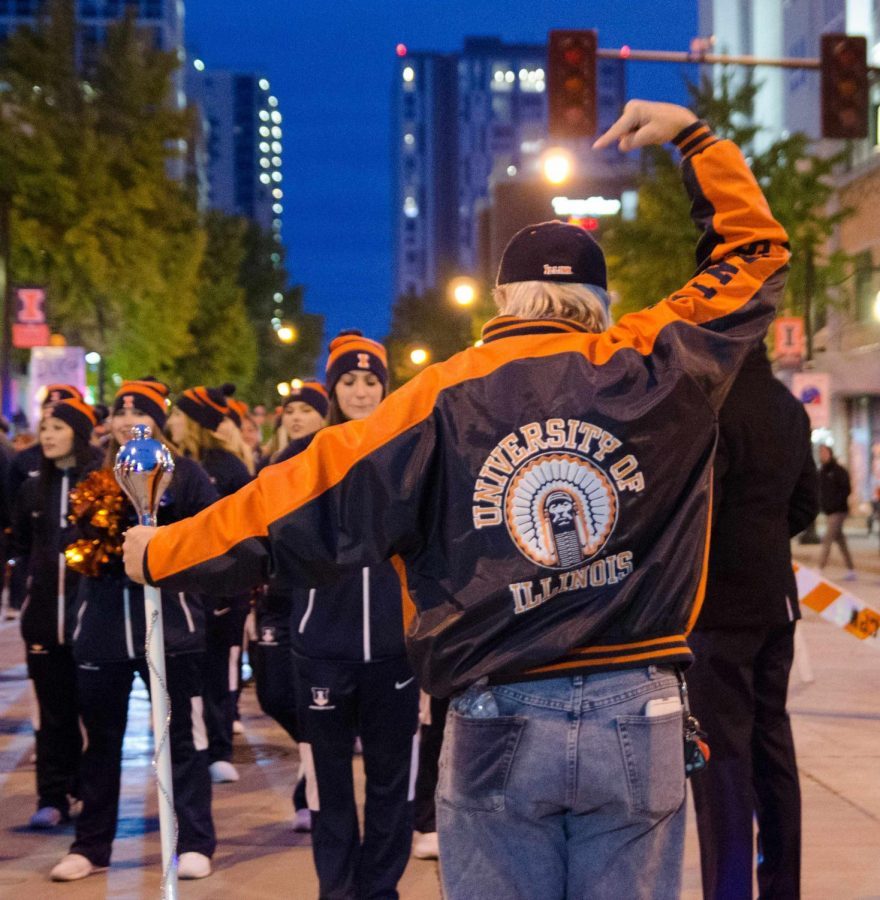University alum sued for ‘Make Illinois Great Again’ shirts
A man shows off his Chief Illiniwek jacket at the 2017 Homecoming Parade. The University is suing Ted O’Malley for associating the University with the Chief in using the symbol.
Apr 5, 2018
The University is suing an alumnus for infringement on University trademarks and copyright over the sale of a T-shirt with the depiction of Chief Illiniwek and the words “Make Illinois Great Again.”
“At Illinois, we vigorously defend all of our trademarks, whether it be the Chief, the word Illinois, U of I, the Block I, the Column I or anything else that would infringe on our marks or confuse consumers,” said Robin Kaler, associate chancellor for public affairs, in an email.
Ted O’Malley, defendant and University alumnus, applied for the “Make Illinois Great Again” trademark with the U.S. Patent and Trademarks Office in early March 2017. He said in an email he meant for the shirts to send a positive message.
“I was just trying to parody Make America Great Again with an Illinois version because I’m a passionate alumnus who believes there are many things that need to be improved, not only at the University, but our state as well,” O’Malley said.
O’Malley said he sold around 150 shirts, which he thinks means there are other people who feel the University can be improved.
Get The Daily Illini in your inbox!
According to the U.S. Patent and Trademark Office’s website, the University filed a notice of opposition to O’Malley’s ownership of the trademark in November. However, this was later dismissed by the USPTO’s Trademark Trial and Appeal Board.
On March 21, The University Board of Trustees filed a trademark lawsuit against O’Malley. In the lawsuit, the University argues they have been referred to as “Illinois” for years and have registered trademarks for “ILLINOIS,” which they claim O’Malley used unlawfully.
The lawsuit argues O’Malley’s shirts combined University “trademarks, trade dress colors, and copyright,” and by doing so he is “creating confusion in the marketplace as to the origin of the clothing, diluting the University’s marks and creating a false association with the University.”
In the suit, the University asks the court to prevent O’Malley from selling or distributing the shirts using University trademarks and copyright. Also, they ask for all of O’Malley’s shirts to be seized by the court and damages suffered, as well as any revenue he has made from “trademark infringement, unfair competition and false advertising in an amount to be proven at trial.”
After the University’s opposition was dismissed by the USPTO, Douglas Johnson, O’Malley’s attorney and founder of The Law Offices of Douglas R. Johnson, P.C., said he and O’Malley reached out to the University offering to buy the trademark. They were in the process of these negotiations when the University chose to file a lawsuit.
“They said they worked hard negotiating with us, but they took about 40 days to respond. Then they filed a lawsuit, which was kind of surprising to me,” Johnson said.
Johnson said his client took great care not to use any University trademarks or make his shirts look like a product made or sold by the University.
“From what I understand, the true test is whether consumers would be confused as to whether this shirt was sanctioned by the University and I do not think anyone could possibly believe that,” O’Malley said.
In the suit, the University claims the Chief drawing on O’Malley’s shirts was made from a 2007 picture of the Chief, which the University gained copyright for in January.
However, Johnson said the original Chief drawing and the T-shirts themselves were made in November, prior to the University gaining the copyright for the 2007 image.
“It was not made from their picture. Even if it were, people have a right to make an artistic drawing of the Chief and Wrigley Field, anything they want. That’s the First Amendment,” Johnson said.
Although the University filed the lawsuit on the basis of trademark infringement, Johnson said he thinks it has more to do with controlling the dialogue.
“There is a strong precedent for the right of the people to articulate their expressions, in particular when it comes to public institutions,” Johnson said. “If we start trying to use tax dollars, public money to prevent public discourse the government doesn’t like, then we’re in big trouble.”






